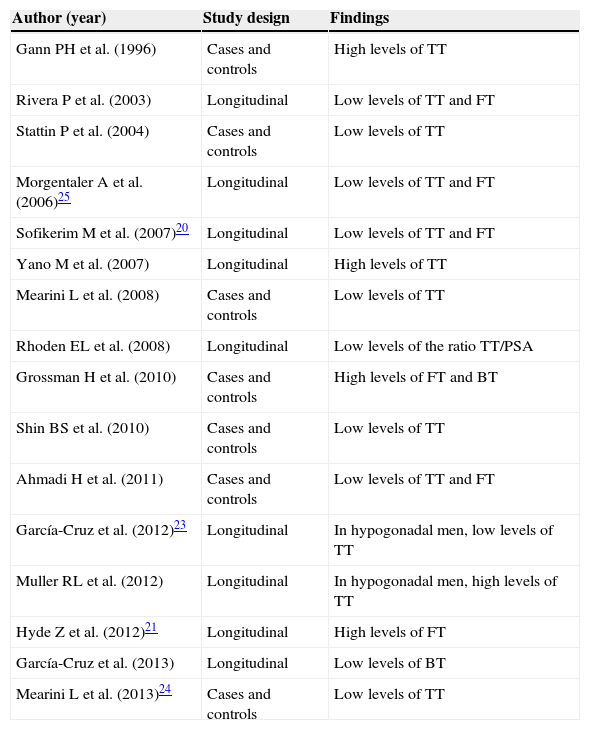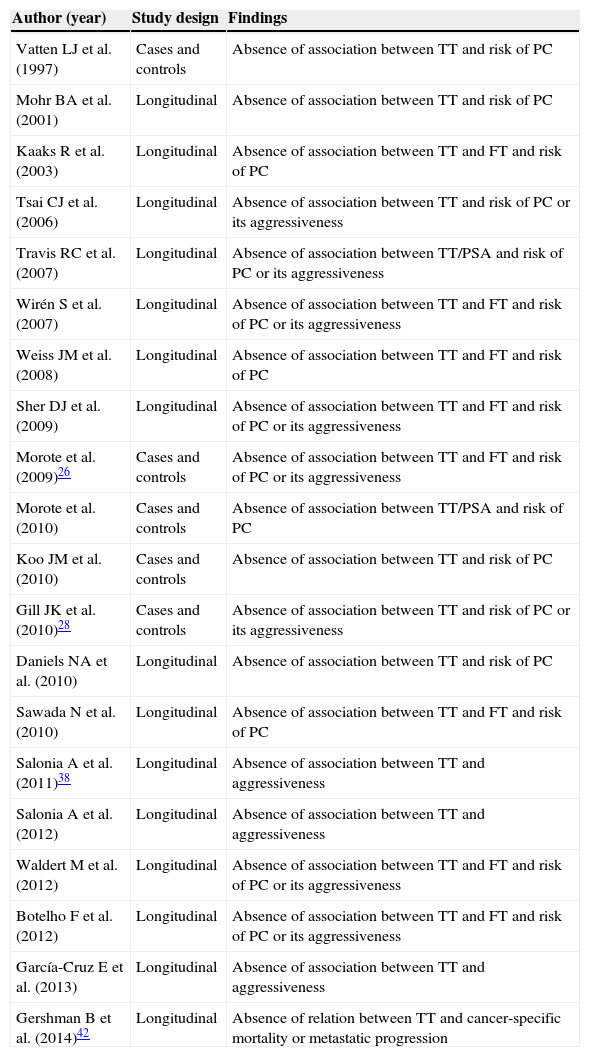Serum testosterone is mostly bound to the sex hormone-binding globulin and albumin. A small metabolically active part is present in the form of free testosterone (FT). The relationship between serum total testosterone (TT) levels and prostate carcinogenesis is debated. Our hypothesis is that the serum FT concentration is more closely associated with the risk of prostate cancer (PC) and its aggressiveness than TT.
ObjectiveTo analyze the scientific evidence that relates serum TT and/or FT levels with the diagnosis of PC and its aggressiveness.
Acquisition of evidenceA systematic review was conducted in PubMed up to January 2015 using the following mesh terms: prostate cancer, sex hormone, androgen, testosterone and free testosterone.
Synthesis of the evidenceWe found 460 publications, 124 of which were reviewed to analyze the evidence. The relationship between serum TT levels and the diagnosis of PC and its aggressiveness is highly heterogeneous. The variability in the design of the studies, the quantification methods and other variables could explain this heterogeneity. In a number of studies that evaluated the estimated or measured FT, the evidence remains equally conflicting.
ConclusionsBased on the current evidence, we cannot recommend the measurement of serum TT and/or TL levels for the diagnosis of PC or for assessing its aggressiveness.
La testosterona en suero está unida mayoritariamente a la hormona transportadora de esteroides sexuales y a la albúmina, existiendo una pequeña parte metabólicamente activa en forma de testosterona libre (TL). La relación entre los niveles séricos de testosterona total (TT) y la carcinogénesis prostática es controvertida. Nuestra hipótesis es que la concentración de TL en suero se relacionaría mejor que la de TT con el riesgo de cáncer de próstata (CP) y su agresividad.
ObjetivoAnalizar la evidencia científica que ha relacionado los niveles séricos de TT y/o TL con el diagnóstico de CP y su agresividad.
Adquisición de la evidenciaSe ha realizado una revisión sistemática en PubMed hasta enero de 2015, utilizando los términos MeSH: prostate cancer, sex hormone, androgen, testosterone, free testosterone.
Síntesis de la evidenciaSe encontraron 460 publicaciones, de las cuales se han revisado 124 para analizar la evidencia. La relación entre niveles séricos de TT y el diagnóstico de CP y su agresividad es muy heterogénea. La variabilidad en el diseño de los estudios, en los métodos de cuantificación y otras variables puede justificar esta heterogeneidad. En algunos estudios en los que se ha evaluado la TL calculada o determinada la evidencia sigue siendo igualmente contradictoria.
ConclusionesLa evidencia actual no permite recomendar la determinación sérica de TT y/o TL en el proceso diagnóstico del CP ni en la evaluación de su agresividad.











